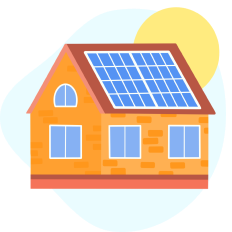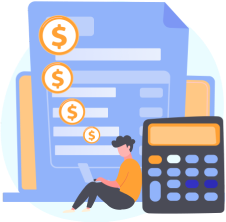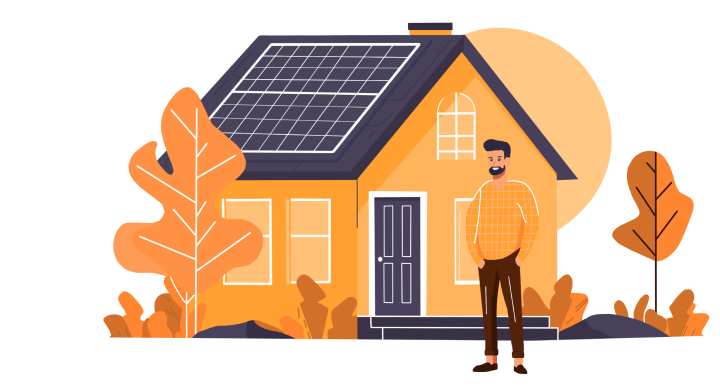When you think about adding solar panels to your home, the initial question that comes to mind is likely about the solar installation costs involved. The solar panel installation cost typically includes three main components: equipment, labor and permits. But there's more to that, and that's why in this article, Solar Energy Host is here to guide you through everything you need to know about the total solar panel cost.
#1: Key components that make up solar installation costs
Solar installation costs consist of equipment, labor and permits.
Solar installation costs typically include equipment, labor and permits. The equipment includes essentials like solar panels, inverters and mounting systems. These components are crucial for capturing solar energy and transforming it into usable electricity for your home. The labor covers the intricate process of installation, wiring and connecting your system to the grid.
Additionally, securing local permits and passing inspections ensures your solar panel installation meets safety and regulatory standards. A clear understanding of these components helps homeowners know what solar system price they're paying for.
System size and energy needs directly influence overall installation costs.
The size of your solar system directly affects the total cost of solar panel installation. Larger systems designed to cover higher energy consumption will inevitably require more panels, leading to higher costs for both equipment and labor.
Taking the time to assess your current energy usage and anticipate future needs can help you determine the right system size for your residential solar installation. Balancing the initial installation cost with potential long-term solar panel savings is key to making an informed decision.
#2: Reducing solar installation costs through incentives and financing
Federal tax credits and state incentives help lower upfront installation costs.
Homeowners can significantly reduce the average cost to install solar panels through the federal solar Investment Tax Credit (ITC).
The federal ITC allows you to deduct a percentage of your solar power system installation costs from your taxes, providing substantial savings right off the bat. Many states also offer additional rebates, grants or local incentives that can further decrease your overall expenses. Be sure to check with local authorities or your installer to explore these programs and maximize your savings.
Taking advantage of these incentives can make solar installation much more affordable.
Financing options allow homeowners to manage the solar energy cost more easily.
Many homeowners are concerned about the upfront cost of solar installation.
Fortunately, there are several financing options to alleviate this concern. Solar loans allow you to spread the typical solar panel installation cost over a period, making it more manageable. Alternatively, leasing programs and power purchase agreements (PPAs) enable you to use solar energy with minimal upfront expenses, though the system's ownership remains with the provider.
Financing solutions can make solar energy accessible without the financial strain.
#3: Long-term savings and financial benefits of solar installation
Solar panels reduce electricity bills significantly over time.
The amount you save on energy bills depends on factors like your location, electricity rates and the size of your system.
On average, homeowners can see a reduction in their electricity bills by 50 percent to 90 percent with the right solar setup. These savings accumulate, allowing you to potentially save thousands of dollars over the lifespan of your solar panel installation.
Factors such as your region's sunlight exposure, local electricity costs and solar system efficiency all play crucial roles in determining the answer to "How much does solar energy save?"
Over time, these savings can make a substantial impact on your household finances, making solar a sound investment.
The return on investment (ROI) from solar installation is typically achieved within a few years.
While the upfront solar installation costs may seem high, the ROI is typically achieved within five to ten years.
After this initial period, the energy your solar panels generate is essentially free, providing you with significant savings over the lifespan of your solar panels installation. The installation costs, local energy rates and the amount of sunlight your system receives all influence the exact ROI timeline.
Think of it as an investment where the initial expense is offset by years of free energy, which can bring peace of mind when it comes to budgeting.
#4: Why find reliable installers on Solar Energy Host
Solar Energy Host simplifies the process of finding reliable solar installers.
By connecting you with trusted local providers, we help ensure that you get the best options available. You can compare quotes side-by-side, enabling you to see where each dollar goes. A transparent solar cost breakdown means there are no hidden fees or unexpected expenses, helping you feel confident about your investment.
Frequently Asked Questions (FAQ)
How much does solar installation cost?
Solar installation costs vary based on several factors.
The size of the system you choose will significantly impact the price, as larger systems require more panels and higher labor expenses. The type of panels and inverters you select also play a crucial role in determining the overall cost to install solar panels. Additionally, your location can affect labor costs and the type of permits required for installation.
Are solar panels worth it?
Many homeowners find their solar panel systems worth the investment.
The primary benefit is the long-term savings on electricity bills, which can be substantial, especially if you live in an area with high energy costs or abundant sunlight. Over time, these savings can offset the initial installation costs, providing a positive return on investment. Additionally, solar panels can increase your home's value and contribute to a reduced carbon footprint, aligning with sustainability goals.
Do you get charged for having solar panels?
Homeowners are typically not directly charged for having solar panels. However, there are associated solar installation costs that come with the territory, such as installation fees and occasional maintenance. In some regions, there might be connection fees for staying hooked up to the electrical grid, but these are usually minimal.
Start your solar journey with Solar Energy Host.
Solar Energy Host is your trusted partner in making the switch to solar power easy and affordable. Our secure and user-friendly platform connects you with top local providers, offering competitive quotes for solar panel installation. Simply enter your basic details, compare quotes, and select the ideal option that suits your needs.
Take the first step toward reducing your electricity bills today with Solar Energy Host!




















